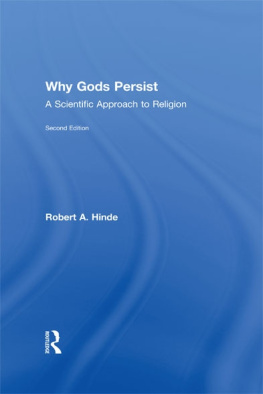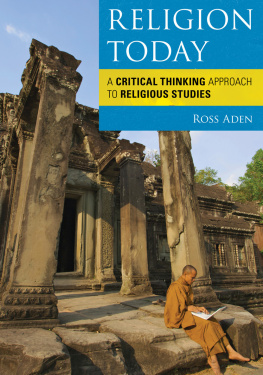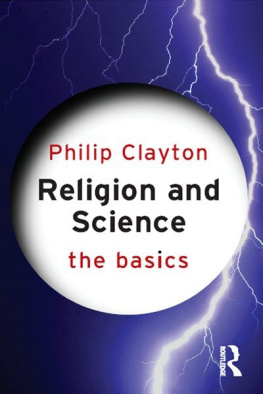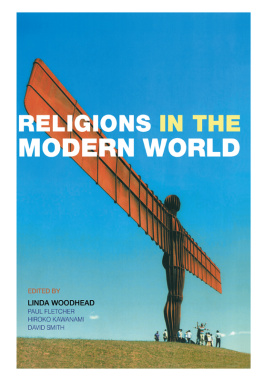The views of the world provided by the Bible and other holy texts contrast with what we know the world to be like. So what is it about religion that appeals to people? Why do religions and religious beliefs persist in the face of increasing secularisation, harsh criticism and even political persecution? Robert A. Hinde argues that it is not enough simply to criticise religion, we must understand it not only how it does so much harm and causes so much conflict, but also how it seems to bring comfort to many. Every aspect of religion is a product of the nature of humankind and of the cultural circumstances we have constructed. To build a better world we must extract from religion what is useful and marry it to our ever-growing knowledge of the world.
Why Gods Persist
A Scientific Approach to Religion
Second Edition
Robert A. Hinde

LONDON AND NEW YORK
First published 1999
by Routledge
This edition published 2010
by Routledge
2 Park Square, Milton Park, Abingdon, Oxon, OX14 4RN
Simultaneously published in the USA and Canada
by Routledge
270 Madison Avenue, New York, NY 100016
Routledge is an imprint of the Taylor & Francis Group, an informa business
This edition published in the Taylor & Francis e-Library, 2009.
To purchase your own copy of this or any of Taylor & Francis or Routledges collection of thousands of eBooks please go to www.eBookstore.tandf.co.uk.
1999, 2010 Robert A. Hinde
All rights reserved. No part of this book may be reprinted or reproduced or utilised in any form or by any electronic, mechanical, or other means, now known or hereafter invented, including photocopying and recording, or in any information storage or retrieval system, without permission in writing from the publishers.
British Library Cataloguing in Publication Data
A catalogue record for this book is available from the British Library
Library of Congress Cataloging in Publication Data
Hinde, Robert A.
Why Gods persist / Robert A. Hinde. 2nd ed.
cm.
Includes bibliographical references and index.
1. Religion. I. Title.
BL48.H475 2009
306.601dc22
2009014810
ISBN13: 978-1-135-25278-6 ePub ISBN
ISBN10: 0-415-49761-2 (hbk)
ISBN10: 0-415-49762-0 (pbk)
ISBN10: 0-203-86875-7 (ebk)
ISBN13: 978-0-415-49761-9 (hbk)
ISBN13: 978-0-415-49762-6 (pbk)
ISBN13: 978-0-203-86875-1 (ebk)
Contents
Figures
| 2.1 | (a) Influences of psychological propensities in interaction with the socio-cultural structure on the components of religious systems. (b) Schematic representation of the probable mutual influences between the components of religious systems |
| 2.2 | A simplified view of the levels of social complexity |
| 13.1 | The Prisoners Dilemma: (a) the given matrix, each tries to maximise own outcomes; (b) matrix transformed to maximise joint outcomes |
Preface
The debate between science and religion has become a matter of urgent public concern. Heads of state claim to feel themselves guided by God, and launch bloody wars. Differences in religiously purveyed morality, in the use of alcohol, in attitudes to women, fuel antipathy between religious groups. Differences in doctrine, seemingly of little consequence to an outsider, have been seized on by leaders to foster recurring conflict in Belfast and Baghdad. Even in the USA, home to so many great scientists, large numbers of citizens believe in the literal truth of the Bible, claiming that God created the world in six days and inventing new myths to explain away the scientific world-view.
To counter these alarming trends some scientists, most notably Richard Dawkins, and some philosophers, such as Daniel Dennett, have launched devastating critiques, exposing the inadequacies of world-views that depend on omnipotent, omniscient beings. But is that enough? Over the centuries religion has withstood many such attacks, though perhaps none so well informed or clearly presented. History shows that religion can withstand doctrinal criticism and political oppression and emerge as strong as ever. I suggest that something more than a sledgehammer, however skilfully it is wielded, is needed. We need to move on. We need to seek a scientific understanding of religions extraordinary resilience. We need to understand the impact of religion on the human psyche. Mounting evidence shows that religion depends on psychological mechanisms evolved in non-religious contexts: we must seek understanding of how those mechanisms contribute to religions ubiquity and persistence. Why is it that every society has its own god or gods? What does religion do for people? Deities are doubly represented in peoples minds, intuitively and theologically: is it that critics are attacking only the latter?
We must also recognise that religions, as well as causing immense suffering and purveying a view of the world that is in many respects plain wrong, have given comfort to many and a world-view that brought satisfaction and at least a degree of peace of mind to some. We need to understand religious commitment and the bases of morality better, so that we can use our understanding to move towards a way of life that does not support false beliefs and does not leave everywhere a trail of suffering. Perhaps, with a critical understanding of religion, we can build a better world than we have had so far. That is my justification for a second edition of this book, though I recognise that it represents only tentative steps towards that goal.
I see myself as an atheistically inclined agnostic, but it was not always so. I was brought up low-church Church of England, but in my teens I lost both faith and interest culminating in conversations on a troopship with an avowed atheist as we watched for hostile submarines, conversations which led to reciprocal conversion, his to Christianity and mine to atheistic agnosticism. He sent me his agnostic books and disappeared into Bomber Command. I put the whole issue on the back-burner during an academic career as a biologist/psychologist. But over the years I came to feel that I could use my academic experience to understand why religion had so strong an appeal to so many. It was at once apparent that the existence of religion poses many exciting scientific problems, including one of the most interesting challenges to the theory of evolution by selection. Although many say that science and religion belong to different spheres, I became convinced that science, and especially the various behavioural sciences, has a great deal to say about religion and morality. That view is confirmed by the striking advances that have been made in the last two decades. This work, published in academic journals as well as books, has received too little notice by the authors of attacks aimed solely at deriding religion and exposing its evil consequences, though it would provide them not only with grist for their mill but a much greater understanding. For that reason, though this book is certainly not intended for academics, I have included references to the work I cite, to be used or disregarded as the reader wishes. In the space allowed, this book can give only a selective survey of what has become one of the most exciting fields of research in the humanities and biological sciences, but I hope it points the way to better understanding and a happier world.









